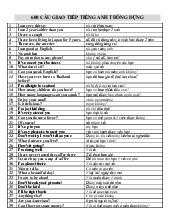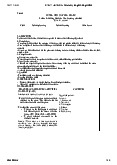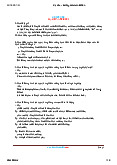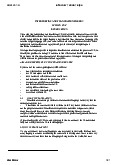










Preview text:
18:43 29/7/24 Deadline pursuit music career UNIT 6 : PURSUIT MUSIC CAREER I. Introduction
As you know, music has long become an indispensable part of our daily
lives, especially for generation Z. We listen to music every day, with
headphones on our ears, we can listen to music on the way to school,
listen to music when we are cooking, when we are washing dishes,
studying and even listen to music when we are taking a bath or sometimes at bedtime.
Listening to music helps us feel more comfortable, relaxed, have more
motivation to work. But… Have you ever wondered where music comes
from? How has music evolved over time? Did people listen to hip-hop
music in feudal times? Is listening to music a lot beneficial or harmful?
Or have you ever wondered how a song we listen every day are
produced? All of these questions will be answered in our today's presentation. So, let's start! II. Body 1. History of music
Music is an art form that combines either vocal or instrumental sounds,
sometimes both, using form, harmony, and expression of emotion to
convey an idea. Music represents many different forms that play key
factors in cultures around the world. A description of music, when asked
by musicians, is quite challenging for them to put into a word. There is
something unique, unto each artist, which music makes people feel a specific way in the world.
Since ancient times, when musical instruments were not yet appeared,
people felt music through sounds originating from nature such as wind,
running water, birds singing... And then, starting from the years 1600s, classical music appeared
People say that there are 4 eras of classical music about:blank 1/11 18:43 29/7/24 Deadline pursuit music career
a. The Baroque era (c. 1600–1750)
The Baroque era spans from around 1600 to 1750.
The era was a busy time for musical development. Composers and
musicians were experimenting with new musical styles and different
ways to write down their music. They also began to agree on a system
for tuning instruments which made it easier to play together.
One of the most defining elements of Baroque music is the harpsichord,
an early keyboard instrument which plucked strings to make its distinctive sound.
The Baroque era also gave rise to new musical styles, introducing the
concerto, sonata, and opera. Instruments began to be grouped together in
more standard ways during the Baroque era, creating the first versions of the modern orchestra.
b. The Classical era (1750–1830)
We use ‘classical music’ (small C) as an umbrella term for Western
instrumental, orchestral and choral music. But the Classical (big C) era
specifically refers to music composed between 1750 and 1830.
Classical era music is sometimes even referred to as ‘Viennese
Classicism’. The city was a bustling hub of musical activity at the time,
home to Gluck, Haydn, Salieri, Mozart, Beethoven and Schubert.
In this era, sonata and symphony styles flourished, along with the new
string quartet form. Solo instrumental concertos rose in popularity as
concerti grossi (concertos for more than one soloist) became less common.
Towards the end of the Classical era, musical styles began to shift and
change. Beethoven heralded in the new era of Romanticism, defying the
traditions passed down by his teacher, Haydn, and becoming more ambitious and inventive. about:blank 2/11 18:43 29/7/24 Deadline pursuit music career
c. The Romantic era (c. 1830–1900)
Despite its name, the Romantic era isn’t known for its romance.
Composers during this era wrote increasingly emotive and intense music
inspired by nature, literature, and poetry.
While still rooted firmly in tonality, for the most part, composers began
to experiment with more chromatic writing, borrowing notes from other
keys to create more interesting and adventurous harmonies.
Further instrument developments allowed for increasing virtuosity and
longer, more complex phrases. And composers began to write more new
musical forms, such as symphonic poems, song cycles, nocturnes and arabesques.
d. 20th Century and beyond (1900s onwards)
Around the turn of the century, musical styles under the ‘classical’
umbrella began to diversify and splinter off into sub-genres more than they ever had before.
The 20th Century era of classical music saw the birth of modernism,
impressionism, serialism and minimalism, further influence from non-
classical styles such as jazz, and even experiments with recorded sound.
However, nowadays we seem to be more familiar with pop music and
especially, in the last 2 years, Vietnamese young people are more approaching rap culture 2. Benefits of music: a. Music Makes Us Human
Music is more than just a structured collection of ear-pleasing tones. A
bridge connecting different cultures and languages is music. Finding
social harmony and establishing connections with other societies can be about:blank 3/11 18:43 29/7/24 Deadline pursuit music career
done through music. Science can't keep up with music in terms of advancement.
Music is a force that can unite humans even as they are separated by
distance and culture. Science can explain many things, but science alone
cannot create them. Science can explain music, but only intellect and emotion can create it.
Not only that, music can soothe the brokenhearted, motivate runners and
kickoff the most epic dance parties, but it also has some serious
scientific benefits for our health and overall wellbeing.
Furthermore, music has a unique link to our emotions, and research has
found that it can be used as an extremely effective stress management tool.
Just like listening to slow music to calm the body, music can also have a
relaxing effect on the mind. Researchers at Stanford University found
that listening to music seems to be able to change brain functioning to
the same extent as medication. Since music is so widely available and
inexpensive, it’s an easy stress reduction option. Moonlight sonata ís an example.
There are numerous tales that attempt to explain how the Moonlight
Sonata came to be. Rumors of Beethoven's encounter with a blind girl
started to spread in the middle of the 19th century. Beethoven was very
empathetic when he saw a blind girl standing next to a piano. The
moment he sat down at the piano, he felt moonlight enter the room
through the window. Beethoven played the famous sonata as though
inspired. In a different version of the tale, the musician was performing
for the blind girl and her brother while he observed the moonlight fall on
her. After it, he was inspired to write "Quasi una fantasia". Some people
believe that this song represents the brilliant composer's unfulfilled love. about:blank 4/11 18:43 29/7/24 Deadline pursuit music career
Anyway, through each delicate melody of the song, we can sense the
affection and deep sympathy. We can genuinely foster human
attachments with the help of music.
b. Devoting for government: US economy
The following section will be discussed. Listed below is a report on “
How Music Powers the American Economy"
A new report released on Feb 9 by economists Robert Stoner and Jéssica
Dutra of Economists, Inc. provides the latest look at the music industry’s
contribution to the U.S. economy. The comprehensive report evaluates
pre-pandemic data and documents music’s ability to drive job creation
and economic growth, especially as the country’s pandemic recovery efforts gets underway.
According to the report, the music industry contributes $170 billion to
US GDP annually and supports 2.5 million jobs nationwide in core
music activities like recording, streaming, and live performance, as well
as adjacent fields like travel, retail, and marketing. As an export, music
generates $9.1 billion in foreign sales annually. And, for every dollar
created by music activities, an additional fifty cents is created in
adjacent business or fields, illustrating that music consistently performs
above its economic weight with a 1.5 times revenue multiplier. about:blank 5/11 18:43 29/7/24 Deadline pursuit music career
This is an illustration of how important music will be to the US economy
in 2020. We shall now talk about the Korean boy band - BTS. In 2018, researchers BTS’ estimated
contribution to the South Korean
economy to be equivalent to that of 26 mid-sized companies combined –
a whopping $3.6 billion a year.
Since then, the figures have grown. With the latest estimate of their
national economic contribution standing at around $5 billion per year,
analysts now expect the group’s total contribution to the GDP of South
Korea since 2014 to be around $29.4 billion – massively outcompeting
the profit from the 2018 PyeongChang Winter Olympics.
The K-Pop industry is a form of national pride, and the relationship
between the music industry and the South Korean government is unlike
that of many western countries – the pair are very closely intertwined
and uniquely support one another.
c. Music contributes to science
We shall now discuss the third advantage of music. The question here is
“What does science have to do with music?”
Science and Sound are inextricably connected because sound is so
fundamental to so much of our life. You can measure your distance from
a lightning strike using sound. You can see to the depths of the ocean
using sound. And believe it or not, sound can now even be used to
levitate small objects! Sound is amazing because it can both be a tool
scientists use to study other phenomenon as well as the phenomenon
being studied itself," said Ruben H. Fleet .
As a good example of this, we've chosen the healthcare industry.
Music helps scientists understand complex functions of the brain and
opens up treatments for patients who are recovering from strokes or
suffering with Parkinson's. Research even suggests that music may alter the structure of the brain. about:blank 6/11 18:43 29/7/24 Deadline pursuit music career
Furthermore, some scientists are using molecules to create music.
Beginning in the early 1980s, researchers conducted the first studies in
which they converted biological data into music.
For the past 40 years, scientists have evolved from utilizing this tactic as
a playful means of identifying patterns in their research to using it as a
means of discovery. Some scientists are using these sounds to create
music that they claim can be therapeutic, while others envision a time
when it will be possible to modify and reverse-engineer sounds to create new materials.
3. The disadvantages of music
a. It’s hard being an artist in the music industry
How much do musicians actually earn? The shifting landscape of the
music industry has made it hard to gauge exactly how much money
working musicians in the modern age actually earn on average. In some
incrediblely , some artists get big cash advances, fast cars, and fancy
mansions, but there are also independent musicians and performers
living a completely different life contracting to flamboyant and exciting music journey in articles.
It’s been years since the music business has been this robust. This mostly
has to do with the rise of streaming services, like Spotify and Apple Music.
However, that doesn’t mean it’s rosy for everyone. A new study from the
nonprofit Music Industry Research
Association shows that musicians, on
average, aren’t raking in the cash you would think.
The survey got information from 1,227 musicians based in the United
States. The organization found that the median musician made around about:blank 7/11 18:43 29/7/24 Deadline pursuit music career
$35,000 in 2017. However, on average, only $21,300 of that amount
came from music-related avenues.
Comparing that number to a couple of years ago: from 2012 to 2016 the
median U.S. musician made between $20,000 to $25,000. So there has
been a rise in pay, but it hasn’t been much. And while the new streaming
money is flowing fluidly, it hasn’t made a big dent in the average artist’s
bottom line. This is displayed in the survey: more than half the
musicians asked, 61%, say music income isn’t enough.
Things seem to be even direr for women artists. Women made up about
34.2 percent of U.S. musicians in 2016. Seventy-two percent of women
musicians say that they dealt with gender discrimination; sixty-seven
percent of women say they have experienced sexual harab
b. Music can make people be distracted
The wrong music can create a dist raction
Certain types of music could be a distraction depending on the listener.
Inspiring music could lead people to daydream, or romantic music could
cause people to focus on memories rather than work. These distractions
may be less severe than a noisy office environment, but choosing the
right music could help further improve productivity and concentration.
The mind can become too stimul ated
Creative centres are stimulated through the forced abstract thinking
caused by music, but this can also mean the mind can be too stimulated.
Some forms of information need to be absorbed through the
conventional method of understanding, being overstimulated can make it
difficult to retain this type of information. This means music might not
always be a good thing depending on the task you are doing.
Music can make the mind for getful about:blank 8/11 18:43 29/7/24 Deadline pursuit music career
The final disadvantage of music is, at times, it can make the mind
forgetful. Listening to music when working could cause you to forget
where you are with a project or to complete work without remembering
what you did. This can make quality control difficult because you might
not always remember what you wrote down or how you completed a given job
c. Loud music can cause noise pollution and harm hearing ability
According to the WHO, over 1 billion people between the ages of 12 and
35 are at risk of losing their hearing because of prolonged and excessive
exposure to loud music and other sounds.
If you listen to music that is louder than 80 decibels for more than eight
hours, you are more likely to develop hearing loss in the future
d. Suicide and cyber Bullying for idols in music industry.
In 2019, the public received a piece of shocking news from a famous
female singer who committed suicide in her own home. She is Sulli
Choi, one of Kpop's 3rd generation idols. Since childhood, Sulli had
been involved in the entertainment industry as a child actress. After that,
her beautiful beauty and impressive talent made her come to SM
Entertainment - one of the largest entertainment companies in Korea.
Officially debuted in 2009 as a singer in the girl group F(x) - the group
that at that time had many resounding success, and not to mention Sulli
was greatly favored by the company when giving her signed many advertising contracts.
Four years later, during the peak of her career, she began to show signs
of depression. Taking a root not only from being famous too early
putting pressure on her life, but also from school violence. Therefore,
she had always been beset by social phobia and panic since childhood.
Some time later, Sulli encountered a controversy about an emotional
relationship with a colleague, which the publish considered wrong. In about:blank 9/11 18:43 29/7/24 Deadline pursuit music career
2015, she officially withdrew from the girls’ group. After that, people
gradually saw not so positive images of Sulli: endless parties, sensitive
images and spreading pedophilia. It was known that this is the true
lifestyle of the female singer, she had to cover up to keep the image of a
famous singer. Starting from that time, the social community raised a
wave of criticism and heavy condemnation of her actions. Although she
repeatedly asked for help on reality TV shows, she was always ignored
and considered to be exaggerating herself. To the limit, in 2019, the 25-
year-old singer committed suicide with an electric wire in her own home
. 4. Nowadays generation’
s opinions about musicial( individual’ s thought)
Some information about Den Vau Den Vau is one of the most popular
rapper in Vietnam nowadays. His birth name is Nguyen Duc Cuong. His
parents migrated from Quang Ninh to Long Khanh to look for
opportunities of stabling their life, and at that time Den was born. After a
while living in Long Khanh, his family came back to Ha Long to settle
down For the first 7 years after graduating from high school, he worked
as an environmental worker in Ha Long Bay. However, this job was
constantly changed overtime. Referring to his current success, he feels
grateful and lucky. He thinks that he is not talented himself, but the
audience has given him the good life he is now. From a young man lived
without ambitions and had low self-confidence about living and working
conditions, he tried to pursue his passion for music day by day, starting
with the first old computer that his mother bought for him to write and
record music. Up to now, he always appreciates what he has and understands who he is.
I had a chance to join Den’s liveshow. And I was shocked. Before that, I
have never heard about his music because I was not really put my
attention in rap. Nevertheless, after a first song, it changed my mind. In a about:blank 10/11 18:43 29/7/24 Deadline pursuit music career
minute, I thought that I was a main character. I clearly understood his
message and then I realized that I was officially be a fan of Den Vau.
What I especially like about Den is the kindness in making music. He
dedicates his energy to the songs that are produced. Unlike most well-
known rappers in the music market, he finds his own way by expressing
simple and close words but reveals many concerns about real life. Den
consider audiences’ thinking and feeling as his valuable resource to write
music, therefore, it is easy for people to immerse in his products. III. Conclusion
Music creates social cohesion, it speaks to all when words can fail, and
wherever you go in the world, it is understood. Music is a universal gift
and its power to connect people is without question. It is an art form
with human interaction at its centre. about:blank 11/11




